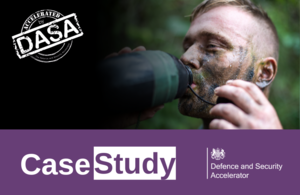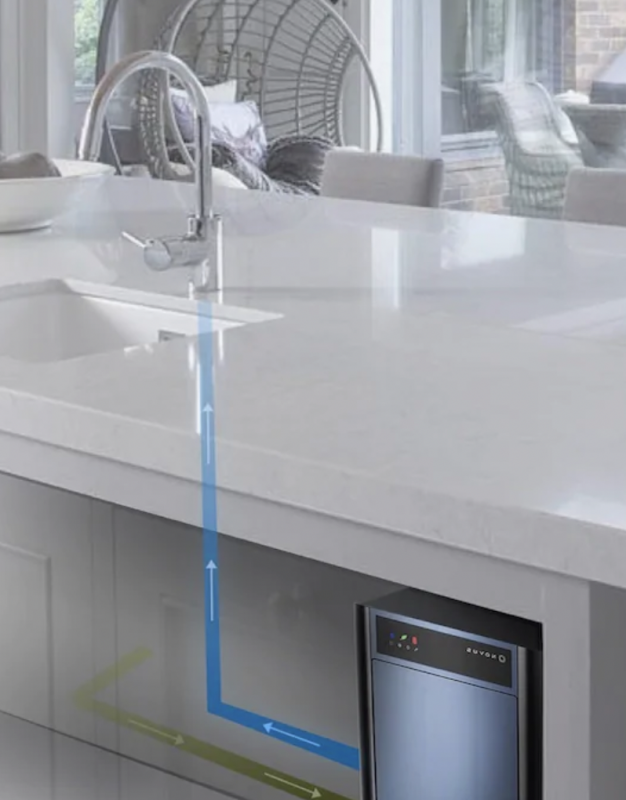Miniature water purification technology ensures safe water for the Armed Forces
Published on by Water Network Research, Official research team of The Water Network in Technology
Miniature water purification technology ensures safe water for the Armed Forces, at anytime, anyplace
Introducing 'Water Independence.' Through DASA, Scotland-based company, Novus, secured funding to develop a portable water purification technology
From: Defence and Security Accelerator

- Novus has developed a high speed, low energy, mobile and vehicle-mounted water purifier capable of producing safe, medical grade drinking water
- Funded through the DASA Open Call, Novus’ innovation provides the Armed Forces a boost to Force Protection and self-sufficiency
- Post-contract support from DASA’s Access to Mentoring and Finance (A2MF) Team is preparing Novus for future investment and market readiness
Clean drinking water is essential for Armed Forces personnel out in the field and is vital for the success of any military or humanitarian mission. However, the transportation, delivery and sourcing of water is a huge logistical burden.
In addition, natural sources of clean water are difficult to find, especially in austere environments, where rivers, wells and lakes often contain harmful contaminants that are difficult to remove with traditional water purifiers.
A lack of readily available clean water not only presents strategic and operational challenges for military personnel, it can also greatly reduce the effectiveness of missions due to illness and dehydration, while also adding avoidable strain on medical facilities and personnel.
Introducing Novus: Water purification specialists
Scotland-based Novus received DASA funding to develop their high speed, low energy water distillation unit that can purify water from practically any source, such as sea water, swamps, wells, floods, rivers, and even waste water.
Novus’ technology utilises innovative high temperature evaporation techniques to evaporate water vapour leaving containments behind, resulting in medical grade water, suitable for drinking, field surgery and wound cleansing.
The purification device is also small, at around the size of two jerry cans, has low power requirements and has no removable parts that need to be maintained or replaced, such as carbon filters or reverse osmosis membranes.
The technology will not only reduce the logistical challenges of transporting bottled water, it will also reduce the risk of waterborne disease affecting mission success and ensure constant clean water supply.
The technology can help Defence by:
- enabling personnel to access clean, safe water out in the field, regardless of water source quality
- improving force resilience by reducing the logistical burden of transporting and relying on bottled water convoys
- enabling scalable water production, with one water purification unit able to create over 100 litres of clean water per day
- promoting sustainability, by reducing the demand on local water sources and bottled water
- reducing the carbon footprint associated with sourcing, transporting and disposing of bottled water, and traditional water purification filters
Making a big splash: from novel idea to live demonstration
Novus started developing the water distillation technology in 2018. They were at an early stage of development and had successfully tested the technology at The University of Edinburgh, but they had a long way to go towards a final product.
Novus began their journey with DASA after a meeting with Dr Debra Carr, Innovation Partner for Scotland, who encouraged them to submit their idea to the DASA’s Open Call for Innovation. Their proposal was successful and Novus received funding to miniaturise the technology for a military case use.
At the end of the project, Novus demonstrated the water purification technology as part of a DASA hosted Demonstration Day in 2021. The virtual event was attended by senior military personnel in the Army and Royal Marines, who witnessed the innovation in action and were impressed by its capabilities to fulfil the challenge of miniaturising water purification capability, to ensure the self-sufficiency of military operations and to meet humanitarian challenges. Additional feedback from the Demonstration Day revealed wider case uses for the technology, such as:
- a vehicle mounted drinking water purifier to extend reconnaissance or mission reach
- a sea landing and amphibious vehicle mounted drinking water purifier to minimise water transport
- a portable, modular and scalable water purification unit for medical and drinking water at point of use for humanitarian missions
- a Royal Navy back up water purification unit for Patrol and Offshore Patrol Vessels (OPVs)
The DASA Demonstration Day had a huge impact on Novus, highlighting end user interest and providing them with credibility to further develop the technology. It also provided a core direction in which they can steer development technology to meet a clear product design specification.
Duncan Peters, Founder of Novus said:
“The DASA team has been the most supportive I’ve worked with in my 12 year startup career. Their team is high energy, engaging, proactive, and always thinking with our best interest in mind. We’ve worked with them for over two years now, and most recently they have supported us by introducing Novus and our technology to high ranking, potential end users within multiple areas of the UK Armed Forces.
“This wouldn’t have been possible without DASA, and it has resulted in demonstrable support for our technology development. Their team has not only opened their network but also identified unknown funding options to help us bring our technology to market, and they are always looking internally for new ways to support us at every stage of its development. We’ve learned that the MoD really does want to fund new innovation, and working with DASA has been like having an additional member of the team, sitting remotely within the MoD framework.”
As a result of DASA’s support, the Demonstration Day and direct feedback from potential end users, Novus is focused on developing a solution that will aid long range reconnaissance teams to help extend mission capability and self-sufficiency. Novus worked with military stakeholders to take the product to its next phase, towards end user trials, where they successfully received a second round of funding from DASA, after they submitted their idea to the Open Call 2021/2022.
What’s next in the pipeline: Investment Showcase
Novus are using DASA funding to further develop the technology into a commercial solution by making the user experience more intuitive, to promote company growth and to develop more variants of the miniaturised water purifier. They are also expanding their engineering and manufacturing team in Scotland, and aiming to enhance their supply chain and business capabilities, to deliver on market interest.
Further post-contract support from DASA’s Access to Mentoring and Finance (A2MF) Team is preparing Novus for future investment and market readiness, and support navigating military procurement taking the product from project to commercial offering.
As part of this development, the A2MF team is preparing Novus for the DASA Investment Showcase later in November 2022, where innovators will pitch their businesses and novel ideas to investors.
Taxonomy
- Purification
- Water Purification
- Water filtration, purifiers, nano filtration